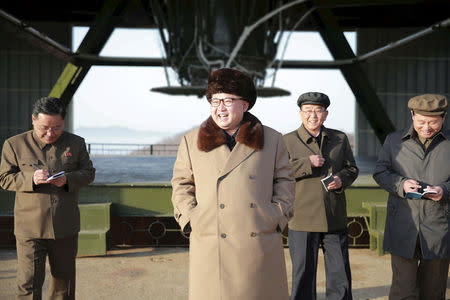U.S. may hold fire on North Korea ICBM test to get intel, if no threat

WASHINGTON (Reuters) - The U.S. military might hold its fire rather than strike a North Korean intercontinental ballistic missile test in order to glean intelligence, if Pyongyang's ICBM launch did not appear to pose a threat, Defense Secretary Ash Carter said on Tuesday. The remarks stood in contrast to U.S. President-elect Donald Trump's vow that, once in office, North Korea would never be able to fulfill its threat to test an ICBM. Trump said in a Jan. 2 Tweet: "It won't happen!" "If the missile is threatening, it will be intercepted. If it's not threatening, we won't necessarily do so," Carter said in his final news briefing before President Barack Obama's administration leaves office on Jan. 20. "Because it may be more to our advantage to, first of all, save our interceptor inventory, and, second, to gather intelligence from the flight, rather than do that (intercept the ICBM) when it's not threatening." The top U.S. military officer, Marine General Joseph Dunford, who will stay in his role as chairman of the Joint Chiefs of Staff, concurred with Carter's remarks. Dunford will be Trump's top uniformed military advisor. North Korea declared on Sunday it could test-launch an ICBM at any time from any location set by leader Kim Jong Un, saying a hostile U.S. policy was to blame for its arms development. Once fully developed, a North Korean ICBM could threaten the continental United States, which is around 9,000 km (5,500 miles) from the North. ICBMs have a minimum range of about 5,500 km (3,400 miles), but some are designed to travel 10,000 km (6,200 miles) or farther. Preventing an ICBM test is far easier said than done, and Trump has given no indication of how he might roll back North Korea's weapons programs after he takes office, something successive U.S. administrations, both Democratic and Republican, have failed to do. Former U.S. officials and other experts have said the United States essentially had two options when it came to trying to curb North Korea's fast-expanding nuclear and missile programs - negotiate or take military action. Neither path offers certain success and the military option is fraught with huge dangers, especially for Japan and South Korea, U.S. allies in close proximity to North Korea. (Reporting by Phil Stewart and Idrees Ali; Editing by James Dalgleish)
